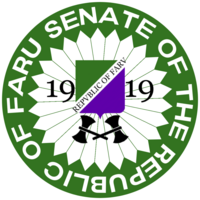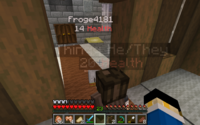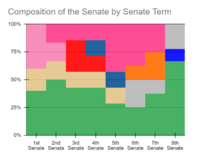Farun Senate
Farun Senate | |
|---|---|
| 10th Farun Senate | |
 Seal of the Farun Senate | |
| Type | |
| Type | Unicameral Legislature |
Term limits | None |
| History | |
| Founded | April 28, 2024 |
| Leadership | |
Premier | |
Opposition leader | Vacant since October 13, 2024 |
| Structure | |
| Seats | 7 |
Political groups | Government
Opposition
|
Length of term | 8 Weeks |
| Elections | |
| Plurality Voting | |
Last election | December 6, 2024 |
Next election | January 3, 2025 |
The Farun Senate, also known as the Senate of the Republic of Faru is the sole Legislative Body of the Republic of Faru.
The Senate is a democratically elected body whose members are known as Senators. There are currently nine Senators who are elected via a simple plurality system in each of the country's districts in terms of eight weeks.
The Senate and its Powers are established by Article II of the Farun Constitution, it is in charge of Legislating and appointing certain government officials such as the Premier and Ministers.
History
The Farun Senate was created on April 28, 2024 following the ratification of the Farun Constitution by the Faruan Constitutional Convention. The convention decided to give the Senate staggered terms, as prior to Infaru 4, Chat servers rarely ever lasted very long. At first, the terms were six weeks, with elections every two weeks, however that quickly showed to be too fast paced for the playerbase, and by the 2nd Senate the terms were lengthened to eight weeks and the elections slowed down to every month.
Early Days
The first Senates were dominated by a right wing coalition of Whigs and Liberal-Conservatives, who governed and legislated under the guidance of Premier Velik iz Dunska. During the first Senate, professionalism and seriousness were far from the norm: shouting, fighting, and what would be considered unsenatorial behavior today were plaguing meetings, with some Senators qualifying their tenure as "boring" [1]. This changed by the second Senate, where rules of conduct were ratified and powers given to the Speaker, which enabled the body to operate in a more dynamic yet orderly way.
The Senate kept being dominated by the right wing, even following the expansion of the Senate from five to seven seats, due to the left being disorganized and failing to win any elections or canvassing enough candidates to even win in any possible scenario. The Liberal-Conservatives did many reforms with this power, and effectively sacked or otherwise weakened institutions that were put forward by the left wing of the Constitutional Convention, such as the Public Assembly and the Presidency, which were meant as balances against the Senate. Despite this, they also instituted policy that revolutionized the country, such as creating a proper currency and reforming elections to be more fair and healthily paced.
First Dissolution
Following the election of the fourth Farun Senate and previous to the second round of a presidential election, then President John McHale dissolved the Farun Senate, as part of a gambit to grab more power for himself. Unfortunately the plan backfired, as people who would have otherwise voted for him voted for his opponent, Priest Viktor, as a result of the decision.
Post Dissolution Era
The dissolution was a major hit to the Liberal-Conservative Party, which lost many races to the short lived Libertarian Party as well as the emboldened New Farun Labor. For the few following terms, the Senate was dominated by the latter, which governed under the guise of many Premiers and coalition arrangements, first with the whigs and libertarians, and later with the Shield Party.
With the power to legislate, neolaborites put forward and implemented many progressive reforms, such as parallel proportional elections, senator recall, public referenda as a means to amend the constitution, and recognition of municipal power. The latter being a long standing contentious issue that was largely ignored by the centralist Liberal-Conservatives.
Following the September Elections, New Labor briefly lost control of the Senate, however thanks to the deterioration of attendance to the Senate, and the collapse of the Shield Party, it kept passing major legislation and even appointing favorable cabinet members.
Post Labor Era
The lack of an actual working class led New Farun Labor to collapse in late September, leaving no opposition to the Liberal-Conservative Party which managed to reach a super-majority of two thirds following the October 2024 Senate Elections.
The Senate elected Maon Vukusti as Premier, and with the strongest mandate to rule in the history of the Nation, and some major reforms were planned. Unfortunately, the massive victory quickly became a curse, as the party was overextended and found difficulty getting competent ministers. The stress from the overextension likely led to Vukusti dying of a heart attack shortly before the November 2024 Senate Elections, leaving his party to pick up the pieces.
Despite this setback, the Liberal-Conservatives saw a successful election which at least temporarily re-affirmed their gains.
After an internal power struggle then treasurer Andrej Sobczyk was chosen by the senate to be Premier, getting a cabinet together and actually initiating a slate of reforms, such as proposing constitutional changes that would limit the president's veto power and ending the stagger. He also initiated numerous smaller reforms, such as regulating and reforming the police, establishing copyright, adding to the penal code and granting autonomy to some populous regions.
Membership
See also List of Farun Senators
As per the constitution of the Republic of Faru, seats are apportioned by the Supreme Court of Faru, which draws up geographical districts that are used to elect Senators. Districts are typically of equal population, and elect a single Senator via a majority vote. Alongside this, geographical districts that meet a certain population requirement may vote in party list elections, which often elect additional Senators.
Stagger
Initially, senators were elected in staggered terms of 8 weeks, with the circuits being geographical. The Southern circuit included the southernmost districts, that being 1, 2, 3 and 4. And was elected alongside the list seats. While the Northern Circuit included the northernmost districts, that being 5, 6 and 7. The stagger was originally put in place due to server longevity concerns, however it became the target of many criticisms with attempts at abolition over the time of its existence. With the December 2024 elections, it was officially abolished, as part of the first national referendum, in a land slide 39-13 (75%-25%) vote.
Historical Composition
| |||||||||||||||
| 05-24 |
| ||||||||||||||
| 06-24 |
| ||||||||||||||
| 06-24 |
| ||||||||||||||
| 07-24 |
| ||||||||||||||
| 07-24 |
| ||||||||||||||
| 08-24 |
| ||||||||||||||
| 09-24 |
| ||||||||||||||
| 10-24 |
| ||||||||||||||
| 11-24 |
| ||||||||||||||
| 12-24 |
| ||||||||||||||



